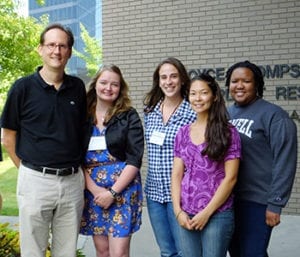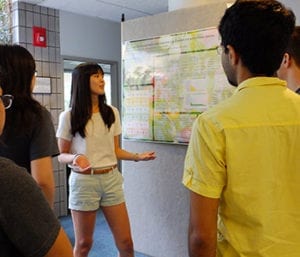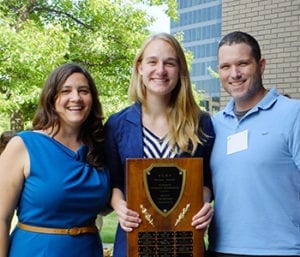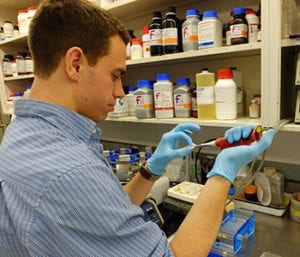News
Internship Applications for 2015 Being Reviewed Now

Professor Eric Richards and his lab group celebrating undergraduate researcher Amy Bump’s research presentation at the BTI Annual PGRP Student Symposium. Amy is from Rocky Mountain College in Montana
Each summer BTI hosts nearly 30 undergraduate and high school summer interns at BTI, Cornell University, and the USDA.
The interns get to participate in plant genome research and see what it’s like to be a research scientist. Blaine Harlan, a 2013 BTI intern from Butler University in Indiana, describes the value of her intern experience this way “I was able to answer a lot of the questions I had about research, graduate school, and research careers. I knew that I wanted to do research, but wasn’t sure which area I wanted to do research in. The lab I worked in is focused on meiosis, which is very complex but applicable to all organisms that undergo meiosis.” Blaine is now a graduate student at the School of Integrative Plant Science,(SIPS) Cornell University and continues to work on meiosis with Dr. Wojtek Pawlowski.
Blaine’s story of uncertainty isn’t unusual for most undergraduates. Neither is the greater sense of clarity she expressed as a result of her summer research experience.
BTI’s Plant Genome Research summer internship program has evolved over the last 14 years. Now students have internship opportunities in bioinformatics and science education, and internships are available to both talented local high school students and undergraduate students recruited from across the country. “What began with a handful of Cornell University students doing summer research in BTI labs has developed into a program that now prepares many students from diverse backgrounds for advanced studies in plant genomics and research-related careers,” says BTI’s Director of Education and Outreach, Tiffany Fleming. Nearly 300 students have participated in BTI’s summer research programs, and for many it was their first time doing research or working with plants in a molecular laboratory setting. At some point in their paths, nearly 80% of our summer interns attend graduate school and receive advanced degrees in STEM fields. (Read Spotlights about former BTI interns Joshua Judkins and Grace Yu and this article in the Cornell Chronicle about former BTI intern James Eaglesham)

Angela Zhang, from University of Iowa, presents her research poster to other interns at the PGRP Student Symposium at the end of the summer

Director of Education and Outreach Tiffany Fleming, BBEP intern Shannon Murphy from SUNY Geneseo, and Dr. Shawn Kenaley, Teaching Laboratory Coordinator celebrate Shannon’s award for best research poster
Between December and early February, BTI accepts intern applications in three areas; Plant Genome Research, Bioinformatics and Bioenergy Education. Undergraduate interns will be assigned a research mentor who will help them develop and complete a 10-week research project. High school interns participate in 6-week research projects. All the interns learn research skills, attend weekly seminars given by plant scientists, and present a poster about their research in a final symposium. Many become co-authors on publications because of their contributions to the lab’s ongoing research.
The Plant Genome Research Program faculty mentors work in genomics, quantitative genetics, proteomics, gene expression profiling, metabolic pathway analysis, and other areas. Their students will combine bioinformatic analysis of DNA sequence data with molecular lab work. Basic and applied research projects in the participating laboratories include studying plant defense against pathogens, biosynthesis of secondary metabolites, interactions with symbiotic fungi, root development, light perception, fruit ripening, metal tolerance, and chloroplast function. These projects incorporate not only important crops such as maize, rice, and tomato but also Arabidopsis thaliana and other genetic model plants.
The interns who express interest in Bioinformatics will help solve the puzzles posed by the massive datasets produced by genome sequences. At BTI, plant molecular biologists and computer scientists can now can access entire genome sequences, and use the details of the proteome, transcriptome, and metabolome to better understand biological systems and interactions. Bioinformatics interns will develop computational tools to store, analyze and integrate large scale plant “omics” datasets. The program offers a unique interdisciplinary training in plant genome research, computer programming and systems biology. Students applying for these internships should have some prior experience with computer programming skills, biology, bioinformatics, and a demonstrated interest in the subject. These students will receive special, intensive training at the beginning of the internship and work closely with a team of scientists and postdoctoral researchers.
The Bioenergy Education intern will learn both about biofuel science and science education. Bioenergy interns will learn about biomass, systems thinking and sustainability, environmental stewardship and policy, curriculum development, instruction, and communication, and will design, pilot and produce an educational activity or resource based on a research project.

BTI intern Nathan Wojtyna, from University of Connecticut, conducted algal biofuel research in Professor David Stern’s lab
The undergraduate Plant Science interns are part of a larger REU, Research Experience for Undergraduates at Cornell that supports interns in many fields who live at Cornell during their 10 weeks paid internships. Interns get to know Ithaca both through organized field trips and their own exploration. Interns attend a research ethics seminar, graduate school panel discussion, research opportunities beyond the REU and weekly faculty seminars and lunches emphasizing the diverse fields of research in plant molecular biology research and the application of this research to agricultural and environmental topics. BTI interns also participate in a “Field Day” to visit local farms and field-based research plots to experience how plant-based laboratory research relates to agricultural, environmental and economic issues.
The local high school students who intern at BTI for a 6-week paid research experience are supported by the Ithaca Garden Club, grants from individual scientists, and National Science Foundation funding.
All the mentors who will be accepting interns into their lab help review the applications, and look for promising and talented students who already demonstrate interest in plant science who can say why they are likely to continue a career in plant science, especially if they have the chance to work at BTI, which may offer technology and research experiences not available to the student at their own school or college.
Explore the BTI web site to learn more about the Boyce Thompson Institute for Plant Research, the internship experience, the faculty who mentor interns, and how to apply for a 2015 internship. Call the BTI Education Outreach office for more information, 607 254 6732.

